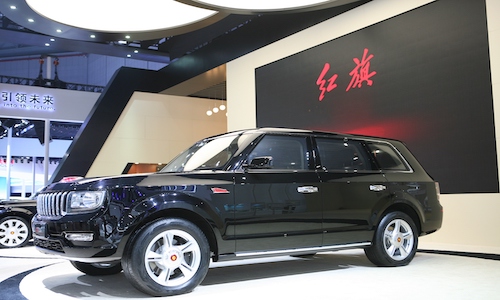SOURCE / INDUSTRIES
China's domestic auto brands rapidly progressing
NEV, intelligence trends provide opportunities

A Hongqi LS5 on display at the Shanghai Auto Show at Shanghai New International Expo Center, April 20, 2015 Photo: VCG
Chinese automobile brands have progressed in both quality and design in the past years, despite reliance on foreign key components. With the rise of new-energy vehicles (NEVs) and intelligent connected cars, domestic automakers face rich opportunities to continue to rise in the market.
During his visit to state-run automaker FAW Group in Changchun, capital of Northeast China's Jilin Province, Thursday, Chinese President Xi Jinping stressed the importance of mastering core technologies and building strong domestic auto brands, according to Xinhua News Agency.
Xi said he was impressed by FAW's achievements in technology innovation and vehicle brand development.
Hongqi, meaning "red flag," is China's iconic sedan brand produced by FAW. The brand was launched in 1958 and its vehicles have been used in parades at national celebrations.
In the first half of the year, Hongqi saw its sales surge by 111 percent year-on-year to more than 70,000 units, outpacing the majority of other auto brands disrupted by the COVID-19 pandemic.
The global auto manufacturing is marked by fierce competition and a growing trend of informatization and smart technologies, posing both challenges and opportunities to Chinese automakers. "We must ensure key and core technologies are in our own hands and aspire to build strong domestic automobile brands," Xi said.
China has nurtured a number of domestic auto brands including Geely, BYD, Changan and Great Wall Motor, which could compete with foreign players in terms of quality, industry analysts said.
Chinese automaker Geely Automobile Holdings said in a note sent to the Global Times that mastering core technologies refers to current and future technologies such as high levels of fuel efficiency and electrification, the two areas where Geely sees itself as having global leadership.
In the first half of this year, Geely sold a total of 530,446 units, down about 19 percent from the same period last year, accounting for 38 percent of the company's full-year sales target. As sales in the auto market showed signs of strong recovery in the second quarter of the year, the company said it decided to maintain its annual sales target of 1.41 million units.
Feng Shiming, an independent auto analyst, told the Global Times that "we are good at visible areas of the entire automotive technology system, such as interior luxury, seat workmanship, interior and exterior design, and smooth human-computer interaction system."
However, there is still a gap when compared with foreign brands in terms of the engine manufacturing, transmission and steering system, Feng noted.
"We still need at least 10 years for domestic brands to catch up with foreign auto brands in engine manufacturing and build-up of brand identity," he added.
Data from the China Passenger Car Association (CPCA) showed that in June, domestic brands accounted for 32 percent of the sales. "The share is low compared with the past few years," said Cui Dongshu, secretary general of the CPCA.
Since June 2018, domestic auto brands have witnessed their market share decline for as many as 20 consecutive months. The outbreak of the COVID-19 pandemic disrupted the auto market, and domestic brands saw sales tumble in April as foreign premium brands recovered, grabbing more market share.
As the world's biggest auto market, China is home to the largest number of domestic brands in the world. But the development of the auto component industrial chain is still a long way behind the development of domestic auto brands. Some key parts rely on imports.
New opportunities
The international automotive manufacturing industry is becoming more competitive and the development of new trends marked by NEV, intelligent connected cars and autonomous driving are reshaping the sector, presenting Chinese auto brands rich opportunities to catch up.
The rise of NEVs has given Chinese auto companies the opportunity to rapidly progress. Chinese companies have made breakthroughs in the three core technologies of NEV batteries, motors and electric control, analysts said.
Shenzhen-based BYD was the first automaker in the world to master the three core technologies. Its annual battery production capacity of 16GWh makes it a world leader in batteries.
Contemporary Amperex Technology Co Limited (CATL), China's largest lithium-ion battery maker, has grown into one of the world's most competitive battery suppliers backed up with its innovative capability, and foreign automakers have been actively seeking cooperation with CATL.
In a recent move, Japanese automaker Honda said that it will buy a one-percent stake in CATL. The two companies said in a joint statement that they would jointly develop EV battery technologies and expand discussions on battery recycling and reuse businesses.
FAW, the cradle of China's auto industry, has also stepped up efforts to reinforce EV innovation, research and development and made breakthroughs in new energy and key technologies.
China has been leading globally in terms of NEV output and sales in the past five years. Despite this, the sector met a turning point in 2019 when sales declined for the first time by 4 percent year-on-year due to a cooling auto market and the reduction of government subsidies.
"Home-grown NEV brands now take the lead and it is one of the development areas where domestic brands surpass their foreign peers," said Feng.
Feng believed NIO, the best-known Chinese EV brand listed at the US stock market, has the ability to compete with US auto giant Tesla based on the Chinese firm's advantages in high-end manufacturing and services.
For the transformation toward smart cars, domestic brands have some natural advantages, according to Cui.
"Supported by technologies like 5G and the BeiDou navigation system, as well as other innovations made by Tencent and Alibaba, China-made smart cars have huge potential to take the lead in the sector," said Cui.

